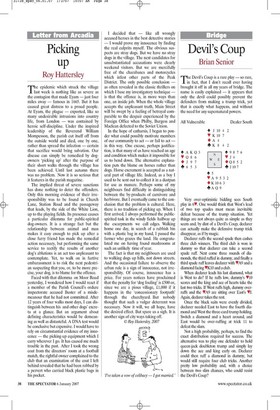Picking up
Roy Hattersley The epidemic which struck the village last week is nothing like as severe as the contagion that made Eyam — just four miles away — famous in 1665. But it has caused great distress to a proud people. At Eyam, the plague — exported, like so many undesirable intrusions into country life, from London — was contained by heroic self-discipline. Under the inspired leadership of the Reverend William Mompesson, the parish cut itself off from the outside world and died, one by one, rather than spread the infection — certain that sacrifice would bring salvation. Our disease can simply be remedied by dogowners 'picking up' after the purpose of their short walks through the village has been achieved. Until last autumn there was no problem. Now it is so serious that it features in the parish magazine.
The implied threat of severe sanctions has done nothing to deter the offenders. Only this morning evidence of their irresponsibility was to be found in Church Lane, Station Road and the passageway that leads, by the side of the White Lion, up to the playing fields. Its presence causes a particular dilemma for public-spirited dog-owners. It is a strange fact but the relationship between animal and man makes it easy enough to pick up after a close furry friend has made the remedial action necessary, but performing the same service to rectify the results of another dog's ablutions is an act too unpleasant to contemplate. Yet, to walk on in furtive embarassment is to risk the next pedestrian suspecting that you, or, to be more precise, your dog, is to blame for the offence.
Faced with that dilemma on Moor Road yesterday, I wondered how I would react if a member of the Parish Council's ordure inspectorate accused Buster of a misdemeanour that he had not committed. After 12 years of four walks most days, I can distinguish between his and other dogs' excreta at a glance. But an argument about defining characteristics would be demeaning as well as distasteful. A DNA test would be conclusive but expensive. I would have to rely on circumstantial evidence of my innocence — the picking-up equipment which I carry wherever I go. It has caused me much trouble in the past. After I took the wrong coat from the directors' room at a football match, the rightful owner complained to the club that an examination of the coat I left behind revealed that he had been robbed by a pervert who carried black plastic bags in his pocket.
I decided that — like all wrongly accused heroes in the best detective stories — I would prove my innocence by finding the real culprits myself. The obvious suspects are stray dogs. But we have no stray dogs in the village. The next candidates for unsubstantiated accusations were clearly weekend visitors. But we are mercifully free of the charabancs and motorcycles which infest other parts of the Peak District. The only possible conclusion — as often revealed in the classic thrillers on which I base my investigatory technique — is that the offence is, in more ways than one, an inside job. When the whole village accepts the unpleasant truth, Main Street will be swept by a feeling of betrayal comparable to the despair experienced by the Foreign Office when Philby, Burgess and Maclean defected to the Soviet Union.
In the hope of catharsis, I began to ponder what could possibly motivate members of our community to act — or fail to act — in this way. One excuse, perhaps justification, is that many of us have reached an age and condition which makes it impossible for us to bend down. The alternative explanation puts the blame on horses rather than dogs. Horse excrement is accepted as a natural part of village life. Indeed, as a boy I used to be sent out to collect it in a dustpan for use as manure. Perhaps some of my neighbours find difficulty in distinguishing between the by-products of carnivore and herbivore. But I eventually came to the conclusion that the problem is cultural. Here, there is no tradition of picking up. When I first arrived, I always performed the publicspirited task in the windy fields halfway up the escarpments we call edges. Walking home one day, in search of a rubbish bin with a plastic bag in my hand, I passed the farmer who grazes the land. He congratulated me on having found mushrooms at such an unlikely time of year.
The fact is that my neighbours are used to walking dogs up hills, not down streets. And the occasional failure to observe the urban rule is a sign of innocence, not irresponsibility. Of course, innocence has a price. For years notices have proclaimed that the penalty for 'dog fouling' is £500 or, since we are a pious village, £1,000 if it happens in the 'concessionary footpath' through the churchyard. But nobody thought that such a vulgar deterrent was necessary. Now it will, we all hope, have the desired effect. But spare us a sigh. It is another sign of city ways taking off.
Roy Hattersley, 2007




































 Previous page
Previous page